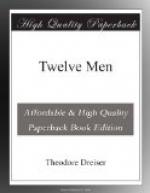“Your Honor, this man here, Mr. Moore, whom I brought before you some time ago, has been comfortably housed by your order, and he’s deeply grateful for it, as he will tell you, and as I can, but he’s an old man, your Honor, and, above all things, needs his rest. Now, of late they’ve been quartering him with a poor, demented sufferer down there who walks a good deal in his sleep, and it wears upon him. I’ve come here with him to ask you to allow him to have a room by himself, where he will be alone and rest undisturbed.”
“Very well, Mr. White,” said the Court, “it shall be as you request.”
Without replying, the old gentleman turned and led the supplicant away.
Everything went peacefully now for a number of years, until finally Uncle Bobby, having grown so feeble with age that he feared he was soon to die, came to his friend and asked him to promise him one thing.
“What is it?” asked the latter.
By way of replying, the supplicant described an old oak tree which grew in the yard of the Baptist Church some miles from Danville, and said:
“I want you to promise that when I am dead, wherever I happen to be at the time, that you will see that I am buried under that tree.” He gave no particular reason save that he had always liked the tree and the view it commanded, but made his request a very secret matter and begged to be assured that Mr. White would come and get his body and carry it to the old oak.
The latter, always a respecter of the peculiarities and crotchets of his friends, promised. After a few years went by, suddenly one day he learned that Uncle Bobby was not only dead but buried, a thing which astonished him greatly. No one locally being supposed to know that he was to have had any special form of burial, the old patriarch at once recalled his promise.
“Where is his body?” he asked.
“Why, they buried it under the old white oak over at Mt. Horeb Church,” was the answer.
“What!” he exclaimed, too astonished to think of anything save his lost privilege of mercy, “who told them to bury him there?”
“Why, he did,” said the friend. “It was his last wish, I believe.”
“The confounded villain,” he shouted, amusingly enough. “He led me to believe that I was the only one he told. I alone was to have looked after his burial, and now look at him—going and having himself buried without a word. The scoundrel! Would you believe that an old friend like Uncle Bobby would do anything like that? However,” he added after a time, “I think I know how it was. He got so old and feeble here of late that he must have lost his mind—otherwise he would never have done anything like that to me.”
And with this he was satisfied to rest and let bygones be bygones.
De Maupassant, Junior




